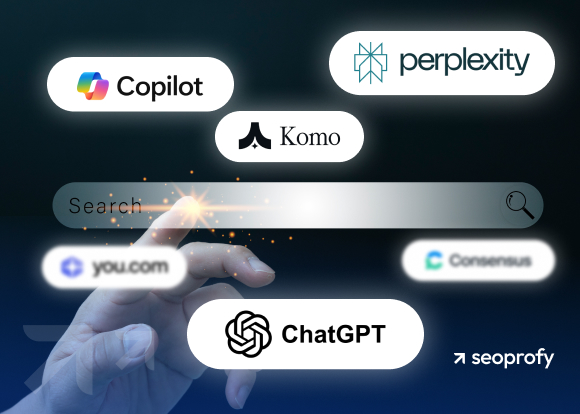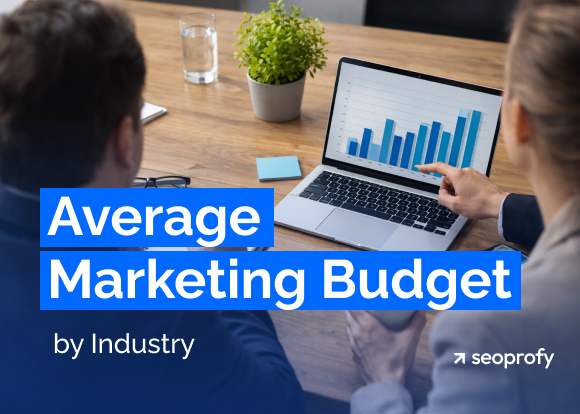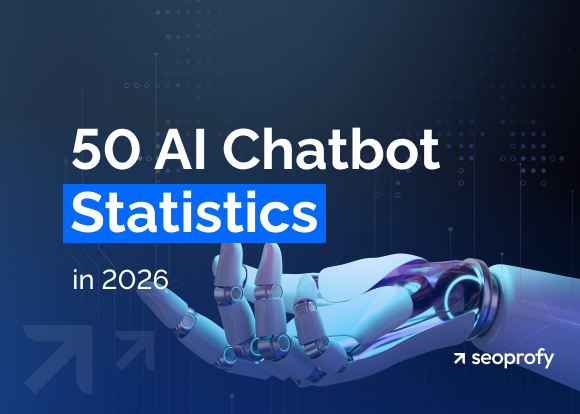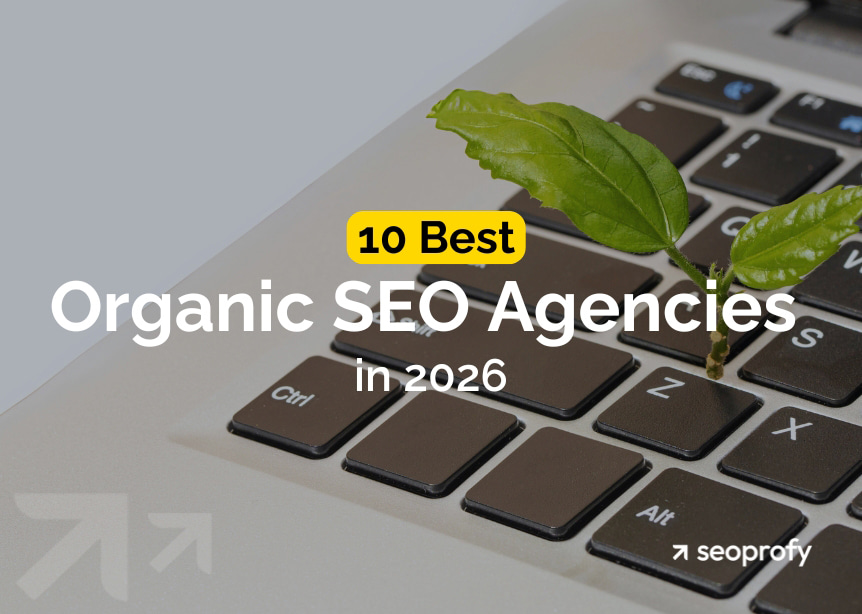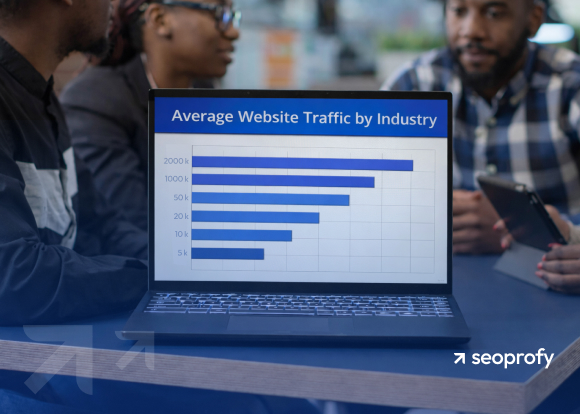“SEO is dead.” “AI will replace SEO entirely.” We’ve heard statements like these on the internet and all they do is confuse anyone trying to grow their website. These “common SEO myths” can hold you back from making progress, and we’re here to get them debunked.
In SEO, understanding what’s fact and what’s fiction can save you time and money. This guide will give you clear answers so you can stop second-guessing your efforts. You’ll understand what works in search engine optimization, avoid wasting time on myths, and feel confident applying strategies that grow traffic and improve rankings.
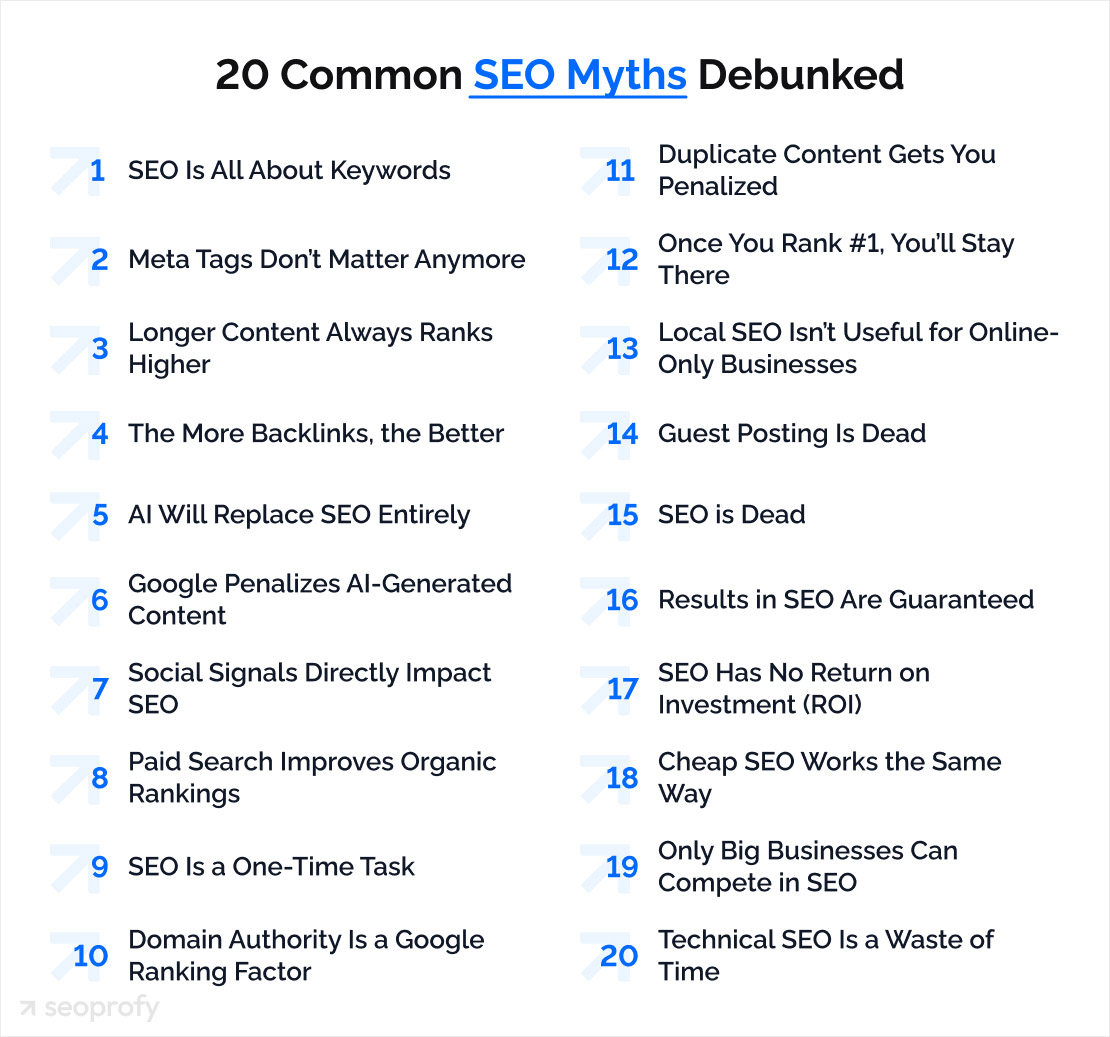
Myth #1: SEO Is All About Keywords
A while back, search engines weren’t as smart as they are today. Back then, the more times a keyword appeared on your page, the better your chances of ranking were. It worked so well that people started overdoing it. The result was a flood of spammy and unreadable content.
However, Google has come a long way since then. Today, rankings are about quality, relevance, and how well your content answers a search query. As a matter of fact, pages that contain too many keywords without offering value are often penalized because it’s against Google’s policies.
To avoid keyword stuffing, you can use the following tips:
- Keep your keyword density at less than 3%. You can use a free tool like Copywritely for this. It’s important to note that this tool has a word limit, so sometimes you’ll need to split the text into two pieces.
- Place your search terms organically throughout your content and try not to overdo it. To add more diversity, you can also use latent semantic indexing (LSI) or similar terms. As a bonus, you can rank for them, too.
Myth #2: Meta Tags Don’t Matter Anymore
Although it may seem like Google doesn’t care about meta tags much, these two pieces of text actually matter for your SEO and traffic. Meta titles tell users (and search engines) what your page is about and can influence where it appears in search results.
Meta descriptions, on the other hand, can encourage users to click on your link by giving a quick summary of what they’ll find on your page. The higher engagement can signal to Google that your content is valuable. So, while meta tags may have evolved, they remain effective for any SEO strategy.
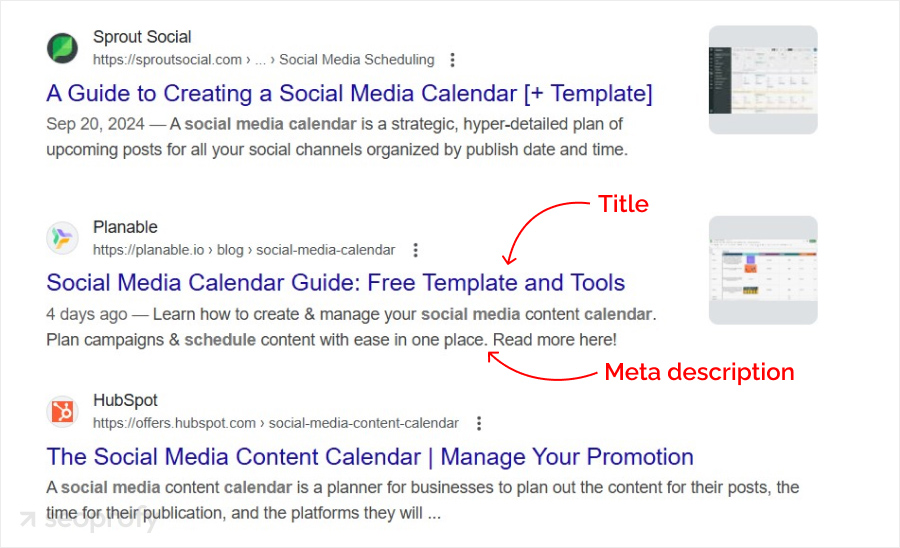
Myth #3: Longer Content Always Ranks Higher
Many myths about SEO revolve around content. You’ve probably heard it before that a longer copy tends to perform better. Popular SEO forums mention it and the recent study by Backlinko suggests that the average word count the top ten pages have on search engines is 1447 words.
So businesses think if they write their articles with this word count, they’ll have more chances to rank. But Google doesn’t rank pages only because they’re long. It takes into account a number of ranking algorithms.
These include how relevant your content is to the user intent and how comprehensively it covers the topic. If your content answers the user’s query and provides value, the length doesn’t matter.
For example, imagine searching for “how to boil an egg.” Would you want a 3,000-word guide with the history of egg boiling or a quick step-by-step explanation? Google knows this, which is why short and relevant content often ranks for such queries, as you can see in the screenshot below:
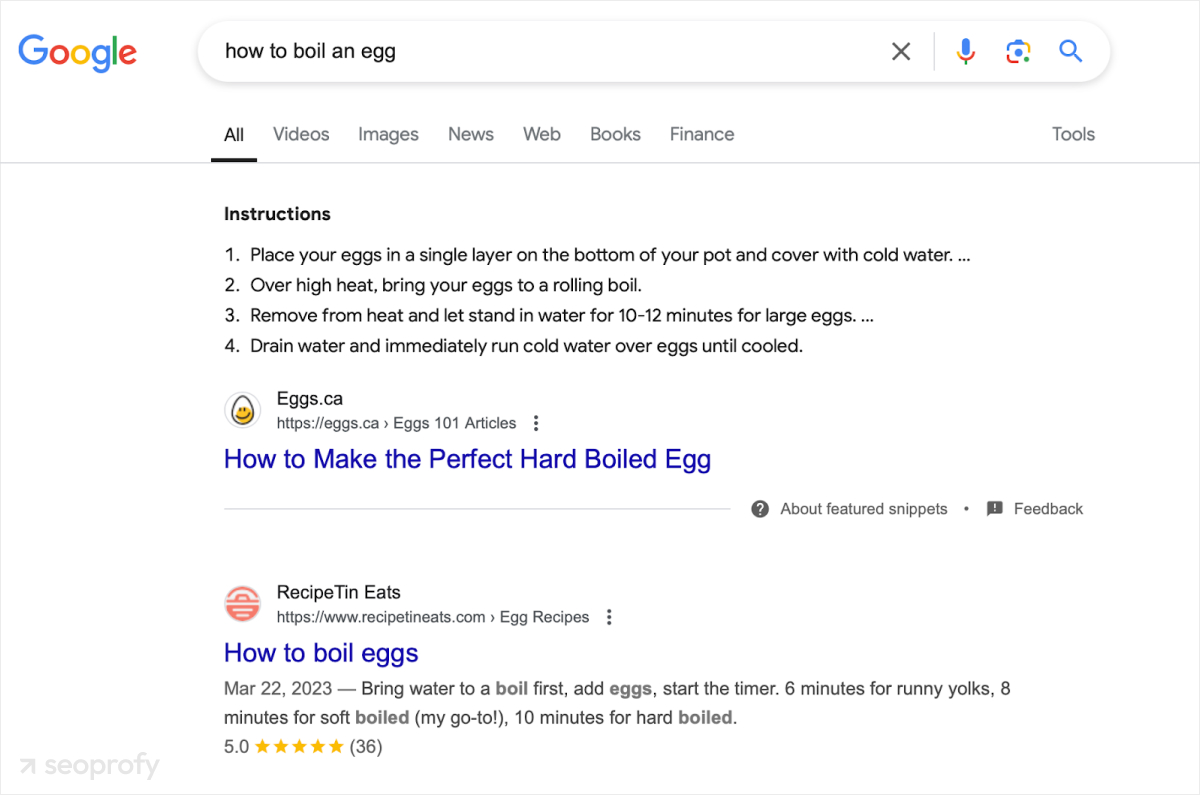
Therefore, for certain topics, like product pages or simple how-to guides, shorter content performs better. How do you know what word count works best? The fastest way is to simply take a look at the search engine results pages (SERPs).
If you mostly see extensive guides, go ahead and write a longer piece. However, if a shorter text can get the job done, don’t feel the need to add unnecessary details that won’t deliver value.
Myth #4: The More Backlinks, the Better
Backlinks are links from other websites that lead to your pages. They show Google that your content is trustworthy and help improve your rankings. We’ve all heard backlinks are a big deal in Google’s ranking system.
So, the more of them you have on your site, the better, right? Not quite. It’s actually one of the common SEO misconceptions. This is because the quality of your links is much more important than their quantity.
A few inbound links from trusted, relevant websites will do far more for your SEO than hundreds from low-quality or unrelated sites. Google looks at how authoritative the site linking to you is and whether it’s related to your topic.
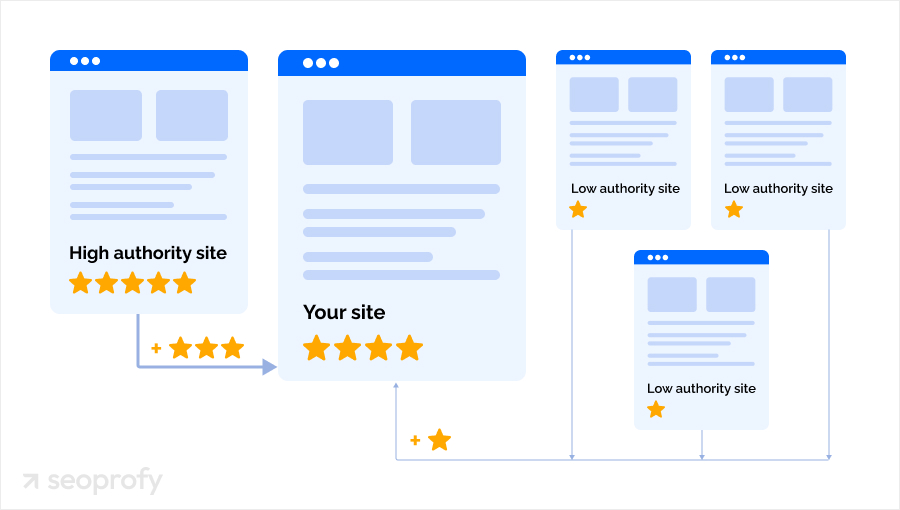
In contrast, spammy links from shady or irrelevant websites can even harm your search engine rankings. Google’s algorithms are designed to spot these low-quality hyperlinks and devalue or penalize the sites that use them.
If you’re curious about how to get high-quality links and where to find reputable websites, start by looking at your competitors. Ahrefs’s Backlink Report can show you where the top-ranking sites in your niche are getting their backlinks.
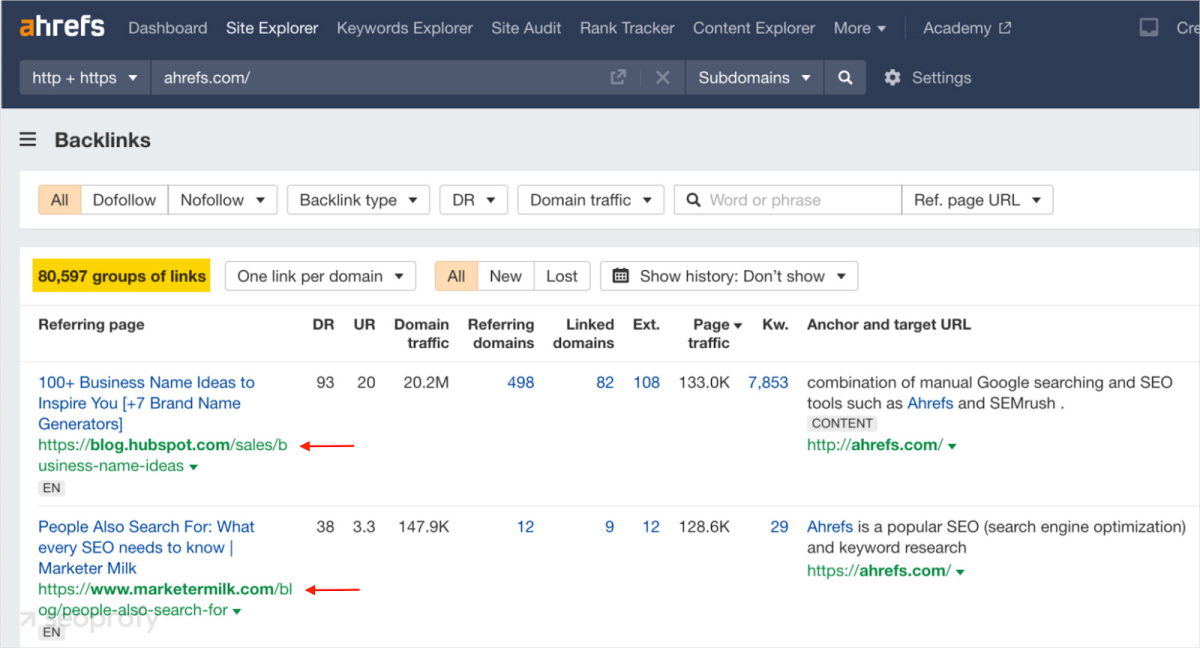
To build similar links, you need to:
- Create content people want to share
- Collaborate with industry leaders
- Avoid questionable link building tactics
It’s also a good idea to check your backlinks from time to time and remove any spammy links to avoid penalties. You can do it in Google Search Console or hire an SEO consultant to help.
Myth #5: AI Will Replace SEO Entirely
This one’s a hot topic. Scroll through LinkedIn, and you’ll see countless posts about how AI might replace search engine optimization. But are these concerns valid? If you think about it, people will always look for products and services.
The only thing that’s going to change is how they do it. The future might mean focusing more on branded terms during keyword research or optimizing for large language models (LLMs). But SEO isn’t going away and 51% of specialists believe that AI won’t even affect their strategies.
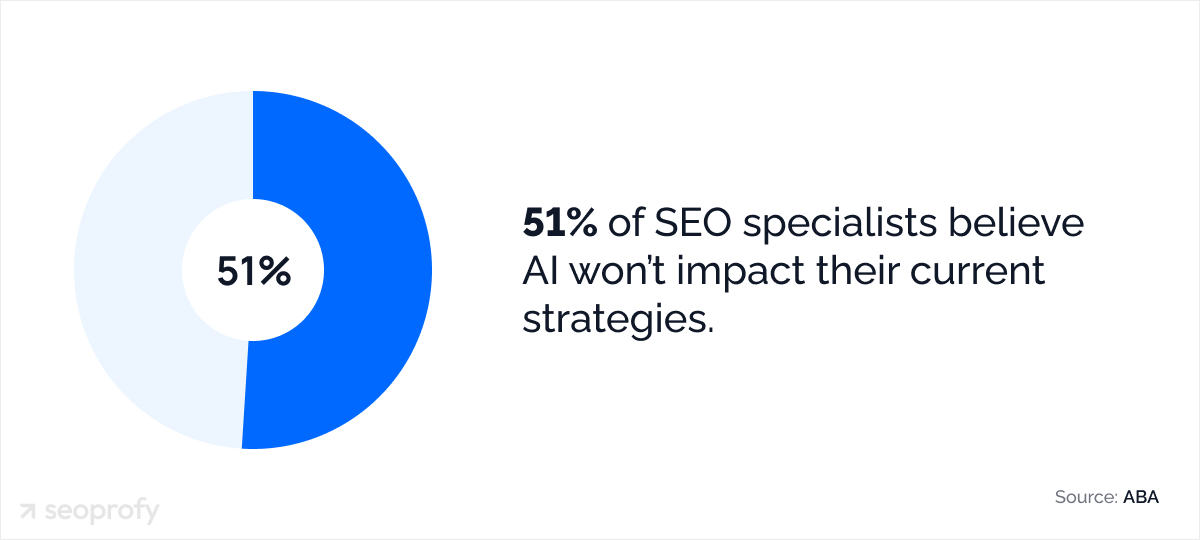
Why? Because people still rely on search engines for in-depth advice, comparisons, and local searches. AI tools can give quick answers, but they often lack the depth, trust, and context that users need when making decisions.
Even Google’s AI-powered overviews depend on content from websites to give accurate results. Without optimized pages, these tools would have nothing to work with. That’s why SEO will remain an important channel.
Myth #6: Google Penalizes AI-Generated Content
It’s no secret that one of the most popular uses for AI tools like ChatGPT is content creation. And with all this generated content we can see on the internet, some businesses get worried: Will search engines penalize my site for using AI?
The simple answer is no. Google doesn’t care whether your content is written by a human or generated by AI. What matters is whether the content provides value. As we’ve said before, Google’s goal is to deliver the best possible answers to search queries. If your content is helpful, accurate, and matches user intent, it has every chance of ranking well — regardless of how it was created.
Problems arise when content, whether AI or human-made, is poorly written, stuffed with keywords, or adds little to no value. Google has been clear about this in its documentation. It evaluates content based on expertise, experience, authority, and trustworthiness (E-E-A-T) — not on whether it was created by AI.

Myth #7: Social Signals Directly Impact SEO
Google hasn’t explicitly stated that social signals (likes, shares, and comments) are a ranking factor. Therefore, it’s more of a myth that these can directly affect your position in search results.
Yet, social media improves SEO indirectly. When your post gets widely shared, it often attracts more views, links, and branded traffic, which Google does recognize. The social activity gets the ball rolling, but it’s those backlinks and engagement metrics that ultimately matter.
Think of social media as a way to amplify your content’s reach. The more people it reaches, the more likely it is to get linked or mentioned in places that Google values. Although social signals don’t directly affect rankings, the attention and engagement they generate can improve your SEO efforts.
Myth #8: Paid Search Improves Organic Rankings
One of the other popular SEO myths is that your ads can somehow improve your website’s position in organic search results. Organic rankings and paid search are two completely separate systems. Paid ads can get you instant visibility, but they don’t influence how Google ranks your website in search results.
Organic rankings are determined by factors like the quality of your content, its relevance to search queries, and the user experience you provide. Paying for ads won’t change that.
However, paid search can still be beneficial and many businesses have it in their overall strategy. Ads can bring more traffic to your site, which might lead to more engagement, brand awareness, and even backlinks.
Myth #9: SEO Is a One-Time Task
SEO isn’t something you can do once and leave behind. If you want to keep showing up in search results and attracting traffic, you need to check how your site is doing regularly.
One big reason is frequent changes in search engine algorithms. In 2023 alone, there were nine confirmed updates, according to Search Engine Land. These updates can change how Google ranks content, so what helped your site perform well a few months ago might not work now.
A vivid example of this is the fact that many websites have lost their traffic after such updates. One of our clients experienced this firsthand. The number of their organic visitors went from 11,000 to 2,500. That’s when they reached out to us for help.

But it’s not just Google’s updates. Your competitors are also constantly improving their sites, new keywords appear and search trends change all the time. The content on your site also needs to be updated with fresh and relevant details, so it can still perform well and bring in visitors.
Bottom line? SEO work is ongoing and businesses need to keep their pulse on changes and adapt their strategies to continue to reap benefits from your SEO efforts in search.
Myth #10: Domain Authority Is a Google Ranking Factor
It’s one of the top SEO misconceptions that Domain Authority improves rankings. DA is a ranking metric invented by MOZ and is used to indicate how strong and trustworthy a website is. Contrary to what some believe, it’s not a recognized factor and has no direct impact on where your site appears in search results.
John Mueller, a Search Advocate at Google, has explained this clearly. They don’t use Domain Authority as a ranking factor. It’s just a number created by third-party tools to estimate how well a site might perform in search results.
So is Domain Authority completely irrelevant? Not really. For example, Ahrefs uses a similar metric called Domain Rating (DR). Like DA, it measures the quality and quantity of backlinks a site has.

DR takes into account:
- How many sites are linking to you
- How authoritative those sites are
- How evenly the links are distributed
These metrics give you an idea of how well your site might perform, but again, they’re not part of Google’s ranking system.
Myth #11: Duplicate Content Gets You Penalized
Your website won’t get penalized if your content appears somewhere else on the internet or in social media, so it’s nothing more than one of the SEO myths. Google simply shows the version in search results that’s the most relevant and trusted.
However, penalties can arise from deliberate and manipulative copying of content from other sites. This includes actions like scraping content or republishing it without any value. So whenever you’re working on pages for your site, try to avoid generic content, like affiliate pages with no unique information.
Myth #12: Once You Rank #1, You’ll Stay There
Getting your page to rank #1 on Google is a big deal, but staying there isn’t guaranteed. Rankings change all the time because of competition, updates to Google’s algorithms, and shifting user behavior. Just because you’re at the top now doesn’t mean you’ll stay there forever.
Other websites are constantly working to outrank you by improving their content and SEO. Google also changes how it ranks pages to make search results better, and this can affect your performance.
Also, your content may be relevant now, but the keywords you used could become outdated. Depending on the subject matter, your page could become old news within a few weeks. And one thing we know for sure, Google does not want to give users old material.
To hold onto your spot, you need to:
- Update your content
- Watch what your competitors are doing
- Keep your site loading fast
- Build more links from credible sources
That’s exactly how you can continue to be number one and receive about 39.8 percent of clicks in search results.
Myth #13: Local SEO Isn’t Useful for Online-Only Businesses
Local SEO does not just apply to physical or brick-and-mortar stores. Online-only companies can also take advantage of local optimization.
It’s a great way to reach prospective clients in particular regions, enhance your visibility, and bring in more leads. As it turns out, 78% of people who search with local intent end up making a purchase.
To show you how this works, let’s look at the screenshot below. If someone in New York searches for “online school”, they’ll see results tied to New York, even without typing the city name. These schools are completely virtual, but they use location-based keywords to connect with students in that area.
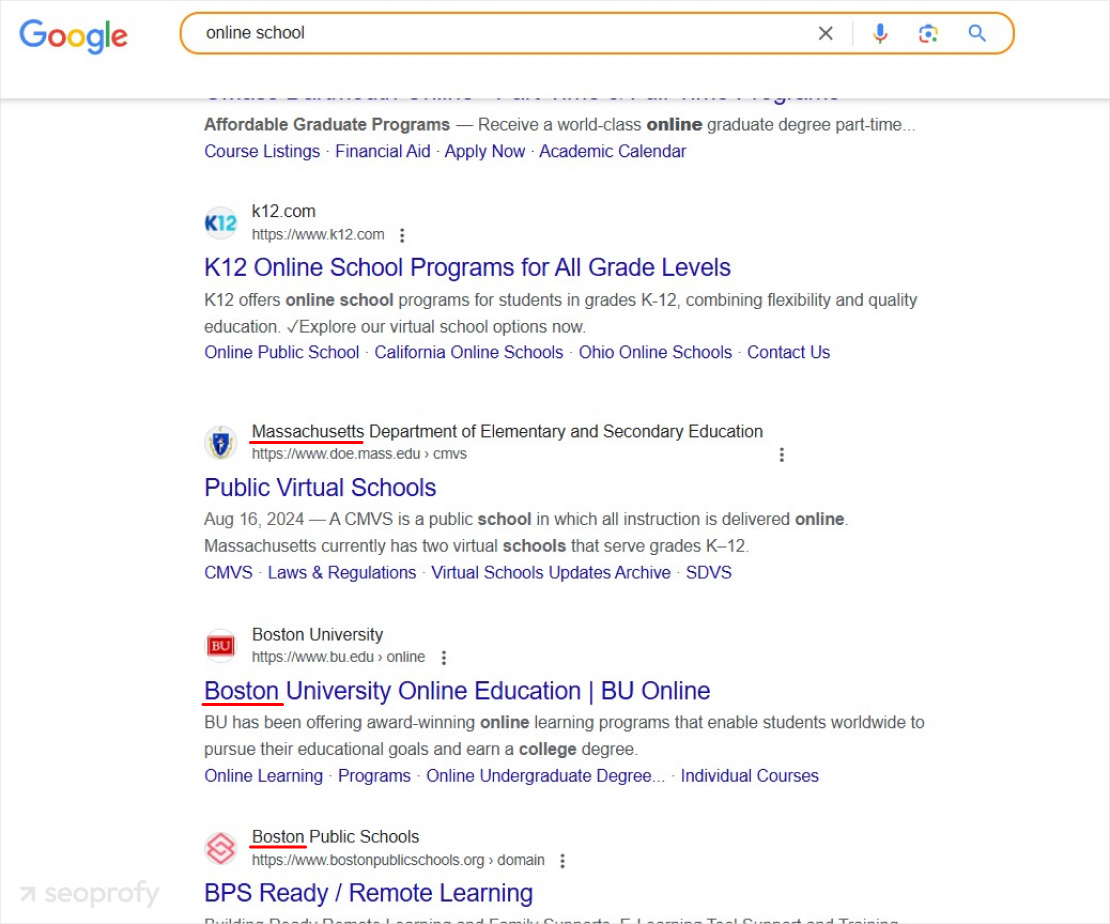
So if someone looks for the same “online school” in Boston, their organic search results would be different and match their specific location:
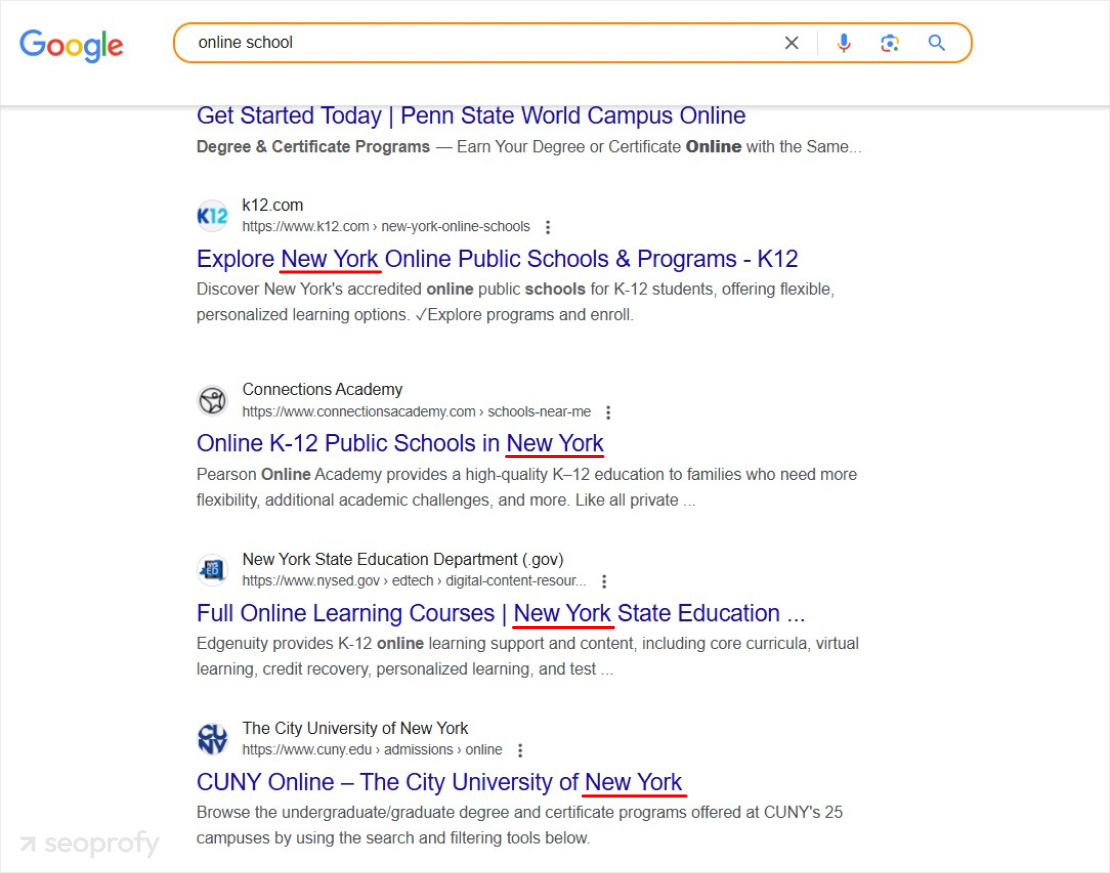
Therefore, Local SEO can work for online businesses too. If your content, page title, and meta description are optimized for a city or region, you’re more likely to appear in SERPs and attract more potential customers.
Myth #14: Guest Posting Is Dead
Our take is that SEO myths related to this come from cases where guest posting was misused. In the past, some marketers used to flood low-quality websites with spammy articles just to get backlinks, and Google cracked down on that. But that doesn’t mean guest posting doesn’t work anymore — it just needs to be done right.
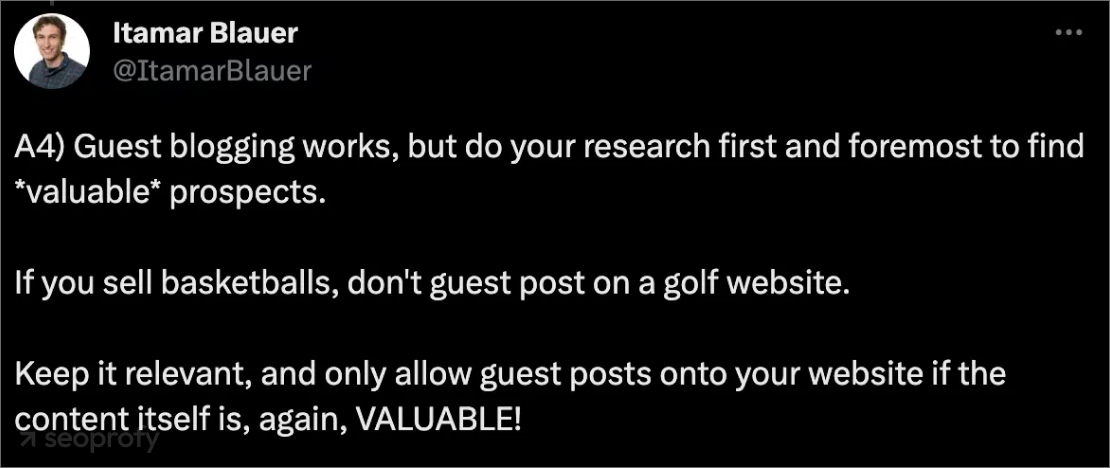
Guest posting is still one of the best ways to get your name out there and show people what you know. If you write for a trusted website in your industry, it helps you reach more people, build credibility, and earn backlinks that can improve your search rankings. That’s why guest posting is often included as part of professional link building services.
So how do you make it work? Here are some best practices:
- Choose websites that are relevant to your niche and have a good reputation
- Write high-quality content that helps their audience
- Use natural links back to your site where it makes sense
- Build relationships with website owners for long-term opportunities
Myth #15: SEO is Dead
As SEO experts, we’ve heard this one many times throughout the last decade, and we want to reassure you that it’s very far from the truth. In fact, it’s more alive now than ever, with Google processing more than 6.3 million searches per minute!
That’s thousands of people every second looking for answers, products, and services. SEO is what helps them find the most appropriate content, and it’s what helps businesses stand out from the myriad of other websites.
We believe that as long as search engines exist, the need for SEO will also be there. AI might be changing how we approach search engine optimization but it’s still one of the best channels to get noticed online and connect with your audience.
Myth #16: Results in SEO Are Guaranteed
SEO doesn’t come with guarantees because the outcomes depend on so many factors like your niche, the level of competition, your location, your budget, and the goals you’re aiming to achieve.
And no agency can promise specific outcomes like “1st page rankings” without understanding all these elements. If they do, we recommend that you avoid guaranteed SEO services as they may use some black hat SEO practices that are against Google guidelines.
What agencies can offer is to analyze your site, competitors, and industry to suggest a realistic timeframe and potential outcomes. But even then, these are projections, not promises.
Besides, search engines are constantly updating their algorithms. So providers need to keep their pulse on these changes and alter strategies accordingly for their customers’ sites.
Myth #17: SEO Has No Return on Investment
Return on Investment (ROI) is how marketers measure the value a channel brings compared to what’s spent on it. It’s an important metric for any business because it shows whether your efforts are profitable. Although you can’t see immediate results from SEO as in the case with ads, it’s still one of the most impactful channels for long-term growth.
Look at companies like HubSpot or NerdWallet. They’ve built multimillion-dollar companies using SEO as a foundation. That’s one of the reasons why 57% of B2B marketers say SEO is their most effective strategy, and in industries like B2B SaaS, it commonly delivers a 702% ROI over three years.
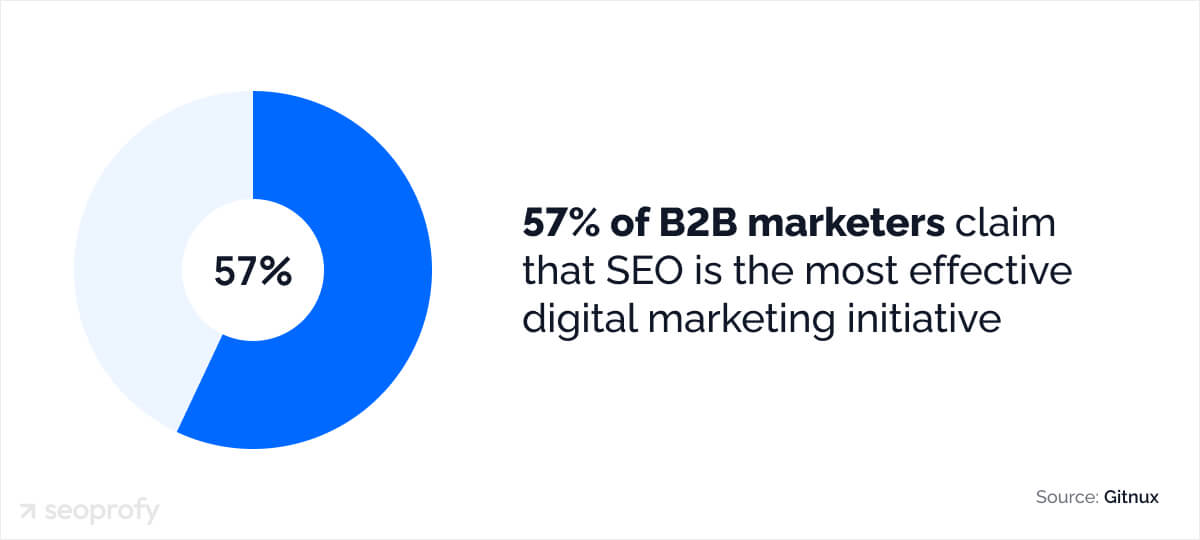
The ROI of SEO does take time to be seen. You might expect results in 6-12 months, but the actual payoff comes in the second or third year when efforts compound. In contrast to ads, which stop driving traffic as soon as you cut the budget, SEO keeps working for your business long after the initial investment.
Myth #18: Cheap SEO Works the Same Way
It’s one of the most common SEO myths that cheap services can provide the same benefits as professional services. In reality, low-cost providers tend to rely on cookie-cutter strategies that don’t fit your business, your niche, or your specific goals.
Cheap SEO also often sacrifices quality in every aspect of its execution. Strategies are poorly planned, and the work may be carried out by inexperienced teams or those relying on outdated SEO tactics. Their work can result in spammy backlinks, irrelevant content, and shortcuts that could harm your rankings instead of improving them.
Therefore, cut-rate services are not your best friends. Your online reputation can be at stake and overall, it can cost you valuable time and resources to recover. It’s far better to entrust your businesses to a professional SEO agency and get strategies backed by expertise and data-proven methods.
Myth #19: Only Big Businesses Can Compete in SEO
The top SEO myths to ignore definitely include this one. It discourages small businesses from trying search engine optimization. We’re here to tell you that it’s not true and that every company can carve out a place for themselves in search results.
If they target niche audiences, optimize for local searches, build links, and create valuable content around customers’ needs, then the results will come shortly after.
In our experience, small businesses SEO services cost around $1,500-3,500 monthly and it’s often enough to improve their visibility.
Take, let’s say, a local coffee shop. If it has the proper optimization in place, it will rank as well as national chains in search results simply because it’s more relevant to the local audience.
In the screenshot below, you can see that Java Man Coffee ranks in the second position for “coffee near me”, even though it’s a small shop with only one location.
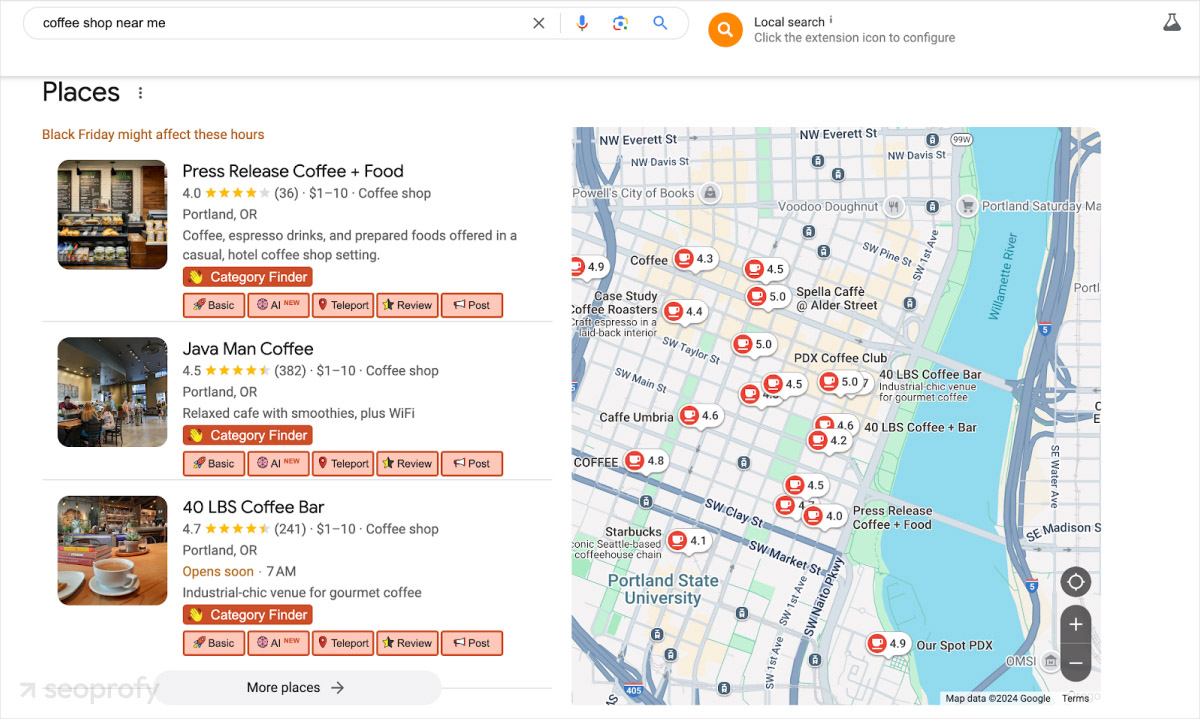
Myth #20: Technical SEO Is a Waste of Time
We’ve seen time and again that companies don’t dedicate enough time to technical SEO or think it’s unimportant. But without technical optimization, your pages will not get crawled, indexed, or seen in the search results.
Your content and backlinks will not be enough if Google isn’t able to find your pages. Especially with ecommerce sites that have hundreds or even thousands of those.
Furthermore, technical optimization makes sure your visitors don’t run into any dead ends and have a smooth experience on your site. Our recommendation is to conduct technical audits from time to time, so your potential customers keep finding your important pages and bring you sales.
Bottom Line
We hope you learned a thing or two from us debunking these SEO myths. Always remember that SEO never stands still, so it’s important to stay updated and know how to separate truth from myth. Doing so can help improve your website’s visibility and bring long-term success.
At our SEO company with 12 years of industry experience, we love helping clients see better results from search engine optimization with our tried-and-tested methods and custom-built tools. Schedule your free consultation with one of our experts today and we’ll discuss how we can help you grow.






